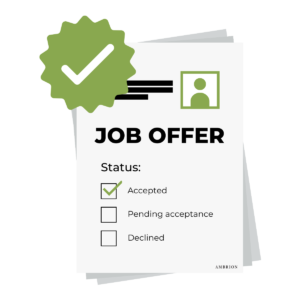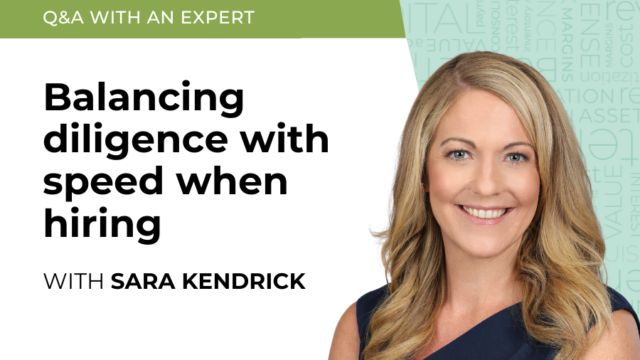Sara Kendrick, Senior Executive Recruiter, often hears from clients and candidates, “Wow, you’ve been doing this a long time. I bet you’ve seen it all!” With over 13 years of recruiting expertise at Ambrion, Sara has certainly seen a lot. But she also understands that the market and hiring landscape are constantly changing, so she is always learning new and better ways of doing things. And Sara encourages her clients to do the same.
In this revealing Q&A article, Sara Kendrick shares her latest insights on:
- What’s behind recent hiring shifts
- The risks of prolonged processes and delayed decisions
- 4 recommendations for faster, more efficient hiring
Question: The hiring process seems to be moving slower in 2024 — what’s behind that shift?
![]()

Sara Kendrick: Based on what I’m hearing from CFOs and Senior leaders in the Twin Cities – cost management is still a top priority for companies in 2024. As a result, employers are becoming more selective about who they hire. They’re looking for accounting and finance talent who can provide immediate value with minimal ramp-up time.
Leaders are also prioritizing staff development as a way to lower costs and improve retention.
It’s worth mentioning that hiring teams are taking longer than usual to extend job offers compared to previous years. While a thorough candidate evaluation is important, employers risk losing out on talented individuals if their process is overly exhaustive.
Can you explain how a drawn-out process impacts companies?
![]()
Sara Kendrick: In my experience as a seasoned accounting and finance recruiter, 3 primary risks can happen when hiring teams move too slowly.
1. Losing the interest of talent
Speed equals interest from a candidate’s perspective. So, when a hiring process drags on, they start questioning how urgently their skills are needed and whether they’ll be valued once hired. A lengthy process also signals to candidates that the hiring team is not 100% sold on them or that they’re the backup plan. No one wants to feel like 2nd place. I’ve seen too many instances where indecisiveness led a promising candidate to pursue more responsive opportunities and accept an offer elsewhere.
2. Creating negative perceptions
A lengthy hiring process, even if inaccurate, can create negative perceptions about the company being inefficient or indecisive. Candidates may wonder about broader organizational decision-making and what it would be like to work there based on their hiring experience. An efficient process avoids sowing seeds of doubt.
3. Internal retention and productivity challenges
When roles stay vacant for extended periods, existing staff inevitably get burned out absorbing extra work. If the increased workload persists too long, good talent may start seeking greener pastures. I’ve seen it happen time and again. Drawn-out hiring can also impact overall team productivity and output.
What does an efficient hiring process look like in 2024?
![]()

Sara Kendrick: To balance diligence with speed, I recommend a hiring timeline of less than 2 weeks — from the first interview to the offer stage.
Many of my clients have found success with this timeline.
Recently, I partnered with a Twin Cities-based employer who had previously struggled to hire top accounting and finance talent. After evaluating their approach, I helped them improve their hiring process to engage talent in a more timely and decisive manner.
The hiring team made offers to their top candidates within half the time it used to take, resulting in an increased acceptance rate.
What advice would you give employers to improve their hiring process and increase the chances of securing their top candidate?
![]()
Sara Kendrick: Here are a few recommendations I give my clients.
1. Accelerate decisions on candidates you already like
You don’t always need multiple people to compare against once you’ve identified someone strong. If they’re qualified for the role, check the most important boxes, and if you really like them, extend an offer before someone else scoops them up.
2. Streamline interview scheduling
With workers back on-site, be flexible about scheduling. Consolidate interviews into a single day (when possible) and schedule them in advance to be efficient and respectful of everyone’s time.
3. Press pause, then redefine
If your opening becomes stale or hard to fill, take a pause. Sometimes, stirring up the applicant pool is as simple as tweaking the title, job specs, or compensation!
4. Keep an open mind when reviewing resumes
Frequent career moves aren’t always red flags. In my 13+ years of experience, I’ve placed plenty of so-called “job hoppers” who excelled in their new role once they found the right long-term fit. Before you make a final decision, I encourage you to consider interviewing them. I’ve found that there’s usually a logical backstory when you probe deeper, such as:
- The candidate was impacted by organizational changes or downsizing
- Or they relocated for family or personal reasons
- Maybe they escaped a toxic work environment
How can partnering with a recruiter help avoid these hiring risks and find great candidates?
![]()
Sara Kendrick: While internal recruiters provide similar value, partnering with an experienced external recruiter can be invaluable in today’s competitive market.

Reputable recruiting partners become an extension of your hiring team, taking care of critical (but time-consuming) tasks like sourcing, screening, scheduling, and offer negotiations. They leverage their wealth of knowledge and vast connections to identify and engage with the best accounting and finance talent before your competition. A great recruiting partner also manages communication and expectations, so promising candidates stay interested in your opening.
This frees you up to keep doing business as usual.
With a reliable recruiter by your side, you can minimize delays, maximize decisions, and secure talent who will drive positive change in your organization!
Final thoughts
![]()
The job market for accounting and finance talent in the Twin Cities will remain highly competitive in 2024. And an efficient hiring strategy gives you the best chance to win them over before anyone else. Have your hiring plan prepared ahead of time, and remember to move quickly when strong candidates emerge. The talent is out there – make sure you’re ready to capitalize on it!

